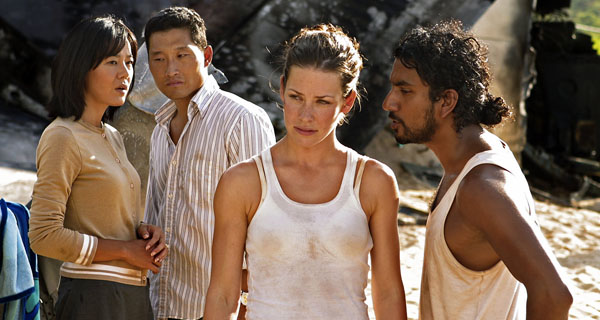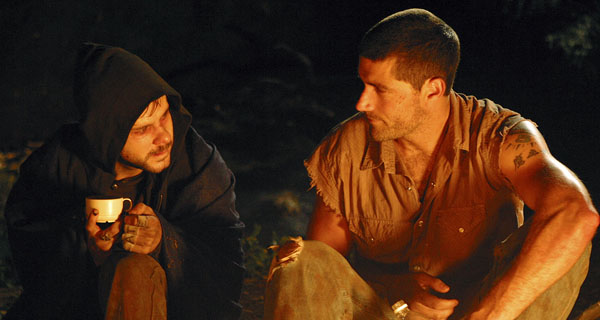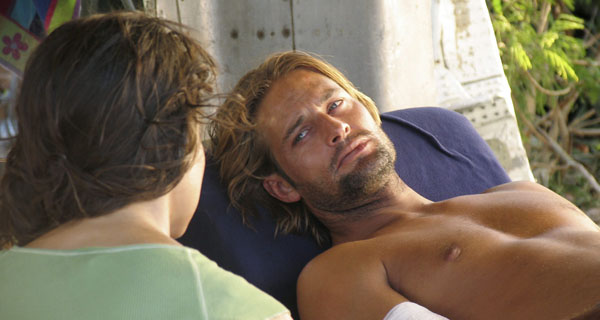I’m on a quest to re-watch every episode of Lost, one per day. As I polish off each DVD, I’ll post my thoughts on the episodes contained therein.
“White Rabbit”
SYNOPSIS: After Jack fails to rescue a survivor swept out to sea, he becomes frustrated with how everyone is looking to him for leadership. He chases the hallucination of his father into the jungle and narrowly avoids death when Locke saves him from plunging off a cliff. Locke tells him that maybe the hallucination of his father means something and tells Jack to continue on his quest. The hallucination leads Jack to a source of freshwater, where he also finds his father’s coffin—empty. Meanwhile, the survivors turn on one another when the water supply gets critically low. Jack returns just in time to quell the conflict and to tell people that they need to start living together or else they’ll die alone. In the flashback, his father tells a young Jack that Jack “just doesn’t have what it takes,” Jack’s mother sends an older Jack to Australia to find his father, and Jack finds out that his father drank himself to death in Sydney.
THOUGHTS: This episode stands out as one of the most thematic in the first season. Jack truly is a reluctant hero and leader. His talents as a doctor and his obsession with fixing people make him act heroically, but he doesn’t want to shoulder responsibility since his father’s pessimism in his leadership abilities still haunts him. This episode also marks the first undercurrents of the “man of science, man of faith” debate, as Locke is convinced that Jack’s hallucinations are something more than just a symptom of stress, insomnia, and dehydration. This episode also sees the survivors realizing that they have to take roots in this strange land since rescue is an increasingly unlikely prospect.
“House of the Rising Sun”
SYNOPSIS: Jack realizes that the caves where he found the fresh water would make for a suitable shelter and a better encampment (despite the existence of two skeletons there, which Locke calls “our very own Adam and Eve”). But some of the survivors—like Sayid and Kate—would rather stay on the beach in hopes of rescue. Thus, the survivors are divided. Meanwhile, Jin attacks Michael out of the blue, and it’s incumbent on Sun to explain that Jin is only concerned about her father’s watch, which Michael had found. But to do so, Sun must reveal that she speaks English. Also, Locke convinces Charlie to hand over his cocaine. In the flashback, a working-class Jin woos socialite Sun and convinces her father to let him marry her. But, as part of the agreement, Jin must do work for Sun’s father, which is implied to be thug work. Sun confronts him about it, and he becomes hostile. She contemplates leaving him but decides at the airport to stay and board Oceanic 815 alongside him.
THOUGHTS: I remember being totally blown away when Sun spoke English for the first time. Though we have only been with the survivors for six episodes now, it was a startling twist. And it sets up a source of dramatic irony while making her character—and Jin, transitively—more accessible to the audience. The flashback storyline was affecting in that it started off sweetly but then soured dramatically. In only a handful of scenes, we see how and why Jin and Sun’s relationship took a turn for the worse. It was the devolution of a relationship as seen through vignettes. And, of course, the last moments were pensive and a bit desolate, as we left the survivors contemplating—and perhaps doubting—their choice of encampment.
“The Moth”
SYNOPSIS: Charlie, struggling with the effects of withdrawal, asks Locke for his stash of drugs. Locke pontificates about gaining strength through struggle and says that if Charlie asks two more times, he’ll give them to him. Back in the caves, Charlie is talking to Jack when their part of the cave collapses. Charlie makes it out, but Jack is pinned inside. Charlie works his way through the tunnel, but a second collapse traps him where Jack is. Finally Charlie spots sunlight, and the two of them burrow out. Charlie asks Locke for his stash a third time but destroys it. Elsewhere, Sayid puts his triangulation plan into effect, but someone knocks him out before he is able to find the source of the distress call. In the flashback, Charlie and his older brother Liam find fame through their band Driveshaft, but Liam and then Charlie fall victim to the rock-star lifestyle and start using. Years later, Charlie flies to Sydney to convince his now-clean brother to join him a comeback, but Liam says that he has a family now and doesn’t want that life, and Charlie leaves frustrated.
THOUGHTS: If only every episode of Intervention were this successful! But I guess no one else has a guru like John Locke. Indeed, this episode convinced me the first time around that John Locke knows everything and that everyone should just do as he says. (Even if it means being live bait for a boar.) We’re still in the mystical-yet-practical John Locke stage and not yet to the fanatical, obsessive John Locke stage. I also like this episode because Charlie not only kicks his addiction but also realizes his self-worth as someone who is anything but useless. The moth metaphor might be a little heavy-handed, but whatever; I still appreciate it.
“Confidence Man”
SYNOPSIS: When Shannon uses her last asthma inhaler, Boone rifles through Sawyer’s loot to find the rest, but Sawyer catches him and beats him. Jack confronts him about it, and they even come to blows, but Sawyer won’t give up the inhalers. He tells Kate that he’ll only fork them over if she gives him a kiss. When she says that no one’s that selfish, he makes her read a letter written by a young kid, who blames Sawyer for sleeping with the kid’s mother and stealing the family’s money, which led to the father killing the mother and himself. Jack allows Sayid to torture Sawyer, but Sawyer still doesn’t talk. Finally, Kate kisses him, and he reveals that he never had the inhalers. Sayid suspect that he’s still lying, attacks him, and slices an artery in his arm; but Jack is able to stop the bleeding. As Sawyer recuperates, Kate realizes that he was the one who wrote the letter, and Sawyer says that he took the name of the confidence man who ruined his family. Also, Locke insinuates to Sayid that Sawyer might have been the one who knocked Sayid unconscious, Charlie woos Claire with some fake peanut butter, and Sayid—ashamed of resorting to his background of torture—leaves to explore the island. In the flashback, Sawyer nearly cons a couple but calls it off when he sees that the couple have a young boy.
THOUGHTS: I try to keep my synopses as concise as possible, but this episode was so packed with plot that I had to write more than I usually do!. I credit showrunner Damon Lindelof, who wrote this episode, for cramming so much story into 42-some-odd minutes of television. It’s hard to have empathy for Sawyer for most of this episode, but—even though Sawyer himself says, “Don’t you dare pity me”—it’s impossible not to by the end. His childhood was nothing short of tragic, and it’s equally tragic that he became the man who destroyed his life, in both name and profession. Sawyer is one of the many characters who seeks and ultimately earns redemption on the island, and this episode marks the first step: admittance. (Plus, we witness sides of Sayid we hadn’t seen before which will be developed even further in the next episode.)




